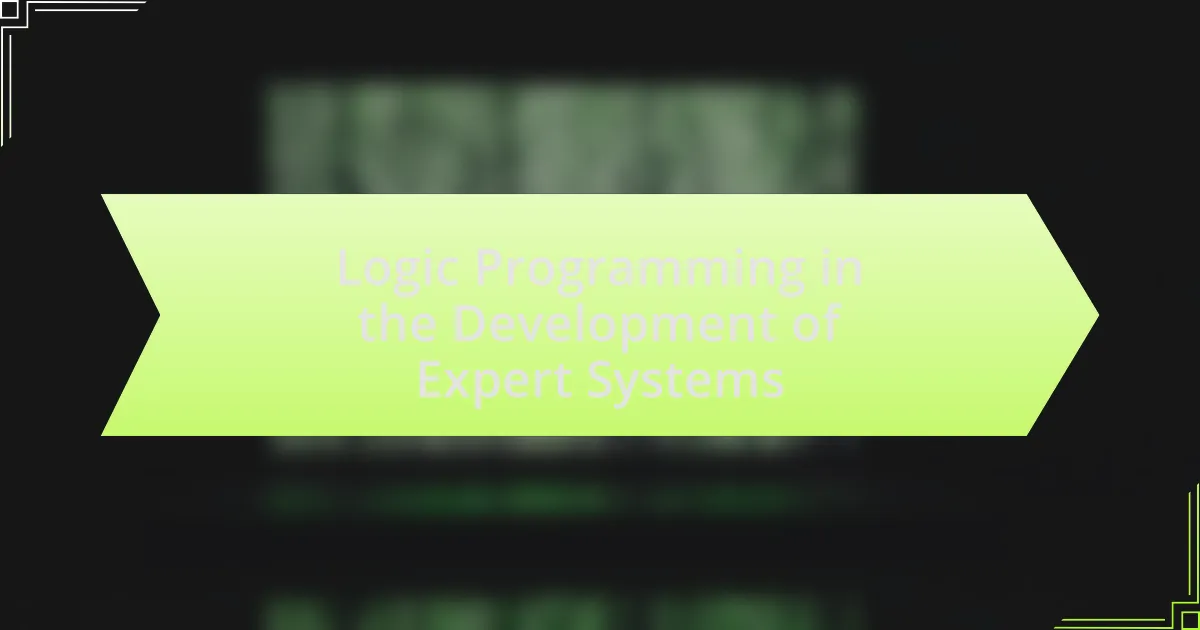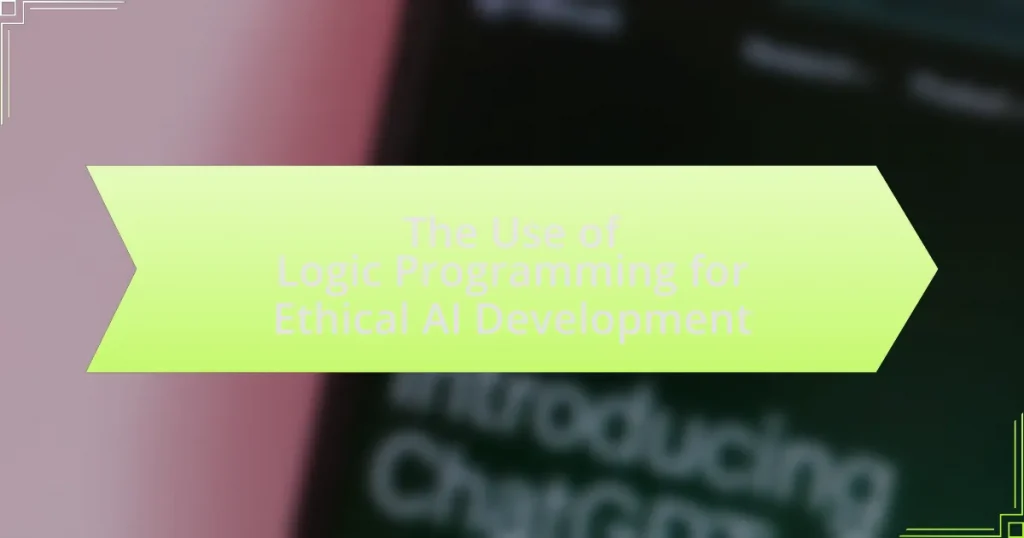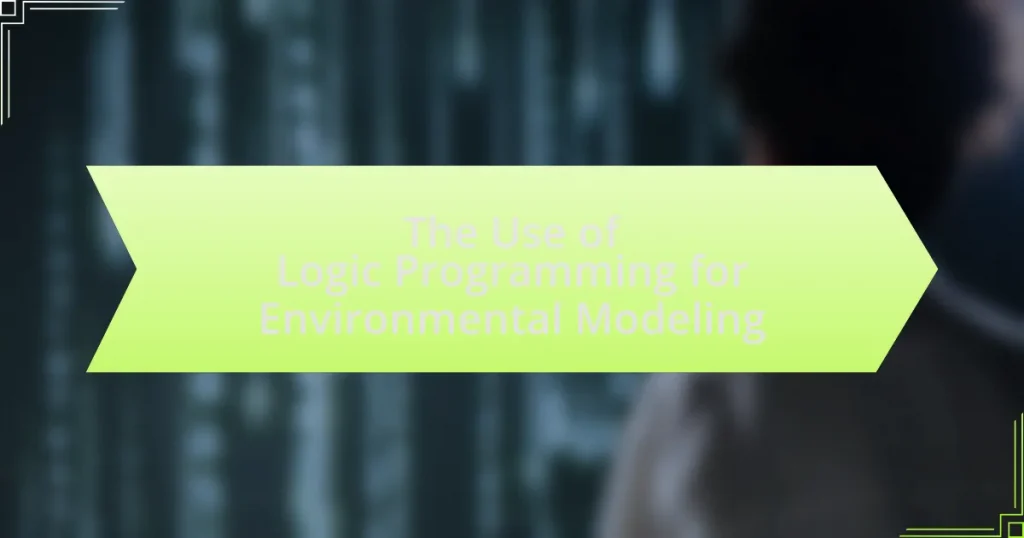Logic programming is a programming paradigm that plays a crucial role in the development of expert systems, utilizing formal logic to represent knowledge and infer conclusions. This article explores the contributions of logic programming to expert systems, highlighting its principles, key components, and methodologies. It discusses the advantages and challenges associated with logic programming, including scalability and performance issues, while also examining common pitfalls and strategies for optimization. Furthermore, the article addresses future trends in logic programming, particularly its integration with artificial intelligence and advancements in natural language processing, emphasizing its significance in enhancing expert systems’ capabilities.
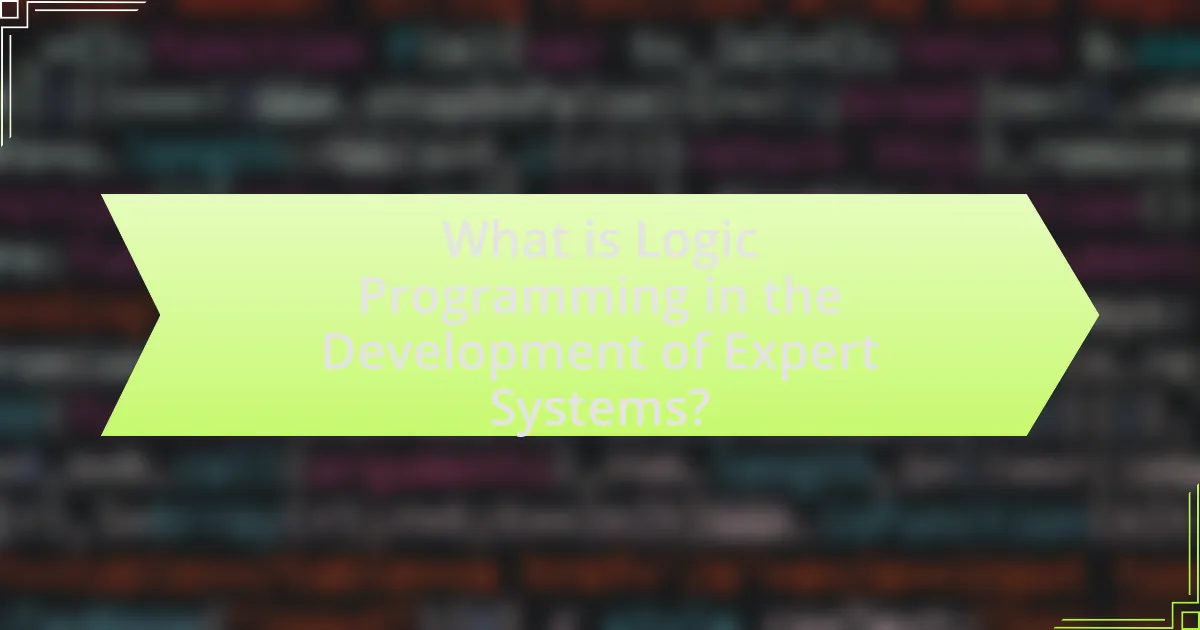
What is Logic Programming in the Development of Expert Systems?
Logic programming is a programming paradigm used in the development of expert systems that relies on formal logic to represent knowledge and infer conclusions. In expert systems, logic programming allows for the creation of rules and facts that can be processed to derive new information or make decisions based on given data. This approach is exemplified by languages such as Prolog, which enable developers to express complex relationships and reasoning processes succinctly. The effectiveness of logic programming in expert systems is supported by its ability to handle uncertainty and provide explanations for its reasoning, making it a powerful tool in fields like artificial intelligence and knowledge representation.
How does Logic Programming contribute to Expert Systems?
Logic programming significantly contributes to expert systems by providing a formal framework for knowledge representation and reasoning. This programming paradigm allows for the expression of complex relationships and rules in a declarative manner, enabling expert systems to infer conclusions from given facts. For instance, Prolog, a prominent logic programming language, facilitates the development of expert systems by allowing developers to define rules and facts that the system can use to derive new information through logical inference. This capability enhances the system’s ability to mimic human decision-making processes, making it more effective in domains such as medical diagnosis and financial forecasting.
What are the fundamental principles of Logic Programming?
The fundamental principles of Logic Programming include the use of formal logic as a programming paradigm, the representation of knowledge through facts and rules, and the execution of programs via a process of logical inference. Logic Programming is based on the idea that programs can be expressed as a set of logical statements, where computation is achieved by deriving conclusions from these statements. This approach allows for declarative programming, where the focus is on what the program should accomplish rather than how to achieve it. The validity of these principles is supported by the success of languages like Prolog, which utilize these concepts to solve complex problems in artificial intelligence and expert systems.
How does Logic Programming differ from other programming paradigms?
Logic programming differs from other programming paradigms primarily in its declarative nature, where the focus is on what the program should accomplish rather than how to achieve it. In logic programming, such as in Prolog, developers define facts and rules, and the system uses inference to derive conclusions, contrasting with imperative paradigms that require explicit instructions for control flow and state changes. This distinction allows logic programming to excel in applications like expert systems, where reasoning and knowledge representation are crucial, as it enables the system to automatically deduce answers from a set of known facts and rules, rather than following a predetermined sequence of operations.
What are the key components of Expert Systems utilizing Logic Programming?
The key components of Expert Systems utilizing Logic Programming are the knowledge base, inference engine, and user interface. The knowledge base contains domain-specific facts and rules represented in a logical format, enabling the system to reason about the information. The inference engine applies logical rules to the knowledge base to derive conclusions or make decisions based on user queries. The user interface facilitates interaction between the user and the system, allowing users to input data and receive explanations or solutions. These components work together to enable the Expert System to simulate human expertise in specific domains.
What role do knowledge bases play in Expert Systems?
Knowledge bases serve as the foundational component of Expert Systems, providing the structured information and rules necessary for decision-making. They store domain-specific knowledge, which includes facts, heuristics, and relationships that the system uses to solve problems or make recommendations. For instance, in medical diagnosis Expert Systems, the knowledge base contains symptoms, diseases, and treatment protocols, enabling the system to analyze patient data and suggest possible diagnoses. The effectiveness of an Expert System is directly linked to the quality and comprehensiveness of its knowledge base, as it determines the system’s ability to reason and provide accurate outputs based on the input data.
How do inference engines function within Expert Systems?
Inference engines function within Expert Systems by applying logical rules to a knowledge base to derive conclusions or make decisions. They utilize methods such as forward chaining and backward chaining to process information. Forward chaining starts with known facts and applies rules to infer new facts until a goal is reached, while backward chaining begins with a goal and works backward to determine which facts must be true to support that goal. This operational mechanism is essential for simulating human reasoning and problem-solving capabilities in domains like medical diagnosis or troubleshooting. The effectiveness of inference engines is evidenced by their ability to handle complex decision-making tasks, as seen in systems like MYCIN, which successfully diagnosed bacterial infections using rule-based reasoning.
What advantages does Logic Programming offer in Expert System development?
Logic Programming offers several advantages in Expert System development, primarily through its declarative nature, which allows for clear expression of knowledge and rules. This clarity facilitates easier maintenance and updates of the system, as changes can be made to the logic without altering the underlying code structure. Additionally, Logic Programming supports automated reasoning, enabling the system to infer new knowledge from existing facts and rules, which enhances its problem-solving capabilities. The use of backtracking in Logic Programming allows for efficient exploration of possible solutions, making it particularly effective in complex decision-making scenarios. These features collectively contribute to the robustness and flexibility of Expert Systems, making them more effective in various applications.
How does Logic Programming enhance problem-solving capabilities?
Logic programming enhances problem-solving capabilities by enabling the representation of knowledge in a formal, declarative manner, allowing systems to derive conclusions from given facts and rules. This approach facilitates automated reasoning, where logical inferences can be made efficiently, leading to solutions that may not be immediately apparent through traditional procedural programming. For instance, Prolog, a prominent logic programming language, allows for the expression of complex relationships and constraints, which can be utilized in expert systems for tasks such as diagnosis, planning, and natural language processing. The ability to express problems in terms of logic rather than control flow leads to clearer problem definitions and often results in more robust and maintainable solutions.
What are the implications of using Logic Programming for scalability?
Using Logic Programming for scalability allows for efficient handling of large datasets and complex queries due to its declarative nature and ability to express relationships succinctly. This programming paradigm enables systems to scale by leveraging logical inference, which can process vast amounts of information without the need for extensive procedural code. For instance, Prolog, a prominent logic programming language, can manage large rule sets and databases effectively, as demonstrated in applications like expert systems in medical diagnosis, where it can analyze numerous symptoms and conditions simultaneously. The scalability is further supported by the ability to modularize knowledge bases, allowing for easier updates and maintenance, which is crucial in dynamic environments.
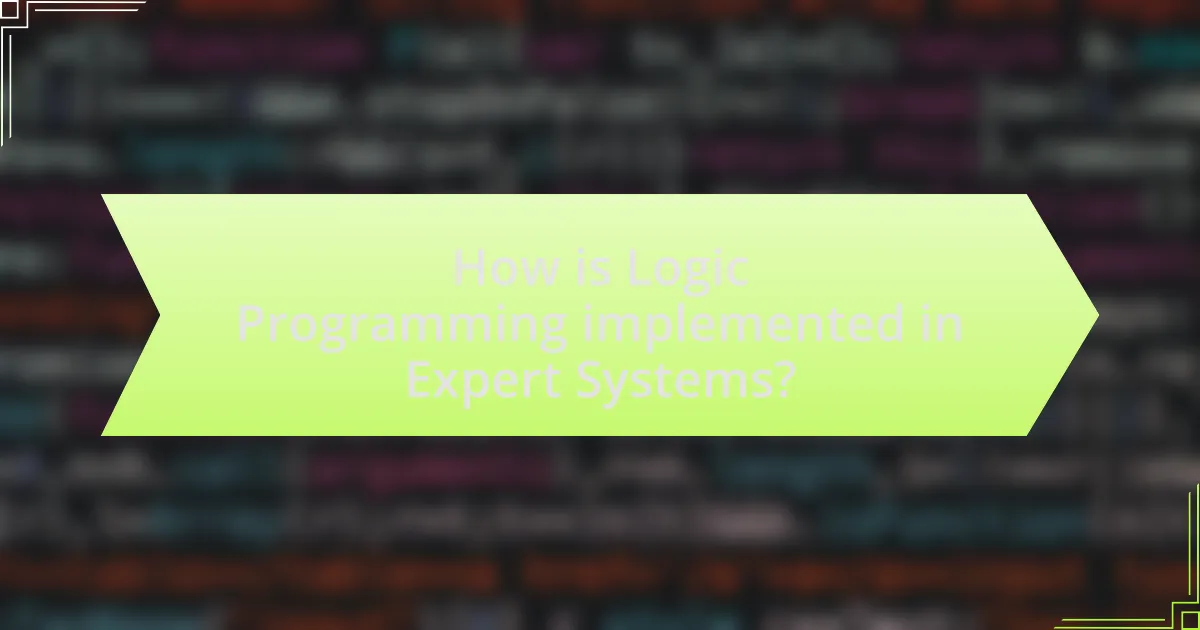
How is Logic Programming implemented in Expert Systems?
Logic programming is implemented in expert systems primarily through the use of formal rules and facts that define the knowledge base. In this context, expert systems utilize logic programming languages, such as Prolog, to represent knowledge in a structured format that allows for automated reasoning. The rules consist of conditional statements that enable the system to infer conclusions from the provided facts, facilitating decision-making processes. For example, a rule might state that if a certain condition is met, then a specific action should be taken, allowing the expert system to simulate human-like reasoning. This implementation is validated by the effectiveness of logic programming in various expert systems, such as medical diagnosis systems, where accurate rule-based reasoning is crucial for providing reliable recommendations.
What programming languages are commonly used for Logic Programming?
Commonly used programming languages for Logic Programming include Prolog, Mercury, and Lisp. Prolog, developed in the 1970s, is the most recognized logic programming language, designed specifically for symbolic reasoning and non-numeric computation. Mercury, introduced in the 1990s, enhances Prolog’s capabilities with strong typing and mode systems, making it suitable for large-scale applications. Lisp, while primarily a functional programming language, supports logic programming paradigms through its macro system and symbolic processing capabilities. These languages are foundational in the development of expert systems, enabling complex problem-solving and knowledge representation.
How do Prolog and other languages facilitate Expert System development?
Prolog and other logic programming languages facilitate Expert System development by providing a framework for representing knowledge and reasoning through rules and facts. Prolog’s declarative nature allows developers to express complex relationships and logic succinctly, enabling the creation of systems that can infer conclusions from given data. For instance, Prolog’s backtracking mechanism efficiently explores possible solutions, making it suitable for tasks like diagnosis and problem-solving in various domains. Additionally, languages like Lisp and Python, with their support for symbolic reasoning and integration of machine learning libraries, further enhance the capabilities of Expert Systems by allowing for more flexible and adaptive solutions. This combination of rule-based reasoning and procedural programming enables the development of robust Expert Systems that can handle uncertainty and provide valuable insights.
What are the syntax and semantics of Logic Programming languages?
Logic Programming languages utilize a formal syntax and semantics that define how programs are constructed and interpreted. The syntax consists of rules for forming valid statements, typically involving predicates, terms, and clauses, while the semantics provides the meaning of these statements, often through models or interpretations that satisfy the logical expressions. For example, in Prolog, a common Logic Programming language, the syntax includes facts, rules, and queries, and the semantics is based on first-order logic, where the meaning of a program is derived from the relationships between its components. This structured approach allows for clear reasoning and inference, which is essential in the development of expert systems.
What methodologies are employed in developing Expert Systems with Logic Programming?
Expert Systems with Logic Programming are developed using methodologies such as rule-based systems, knowledge representation, and inference engines. Rule-based systems utilize a set of “if-then” rules to derive conclusions from given facts, allowing for straightforward decision-making processes. Knowledge representation involves structuring information in a way that a computer system can utilize it effectively, often employing logic-based frameworks like Prolog. Inference engines apply logical reasoning to the knowledge base to draw conclusions or make decisions, ensuring that the system can simulate human-like reasoning. These methodologies are foundational in creating systems that can mimic expert human decision-making in various domains.
How does the knowledge acquisition process work?
The knowledge acquisition process involves gathering, structuring, and validating information to create a knowledge base for expert systems. This process typically includes identifying relevant knowledge sources, extracting pertinent information, and organizing it into a format that can be utilized by the system. For instance, knowledge can be acquired through interviews with domain experts, analysis of existing documentation, or observation of expert behavior. The effectiveness of this process is crucial, as a well-structured knowledge base enhances the performance of expert systems, enabling them to make accurate decisions based on the acquired knowledge.
What are the steps involved in designing an Expert System?
The steps involved in designing an Expert System include problem identification, knowledge acquisition, knowledge representation, inference engine development, user interface design, and system testing and validation.
Initially, problem identification defines the specific domain and tasks the Expert System will address. Knowledge acquisition involves gathering relevant information from domain experts and existing resources. Knowledge representation organizes this information in a format suitable for processing, often using rules or frames. The inference engine is then developed to apply logical reasoning to the represented knowledge, enabling the system to draw conclusions. User interface design ensures that the system is accessible and user-friendly for end-users. Finally, system testing and validation confirm that the Expert System operates correctly and meets the intended requirements.
These steps are essential for creating a functional and effective Expert System, as they ensure that the system is built on a solid foundation of knowledge and reasoning capabilities.
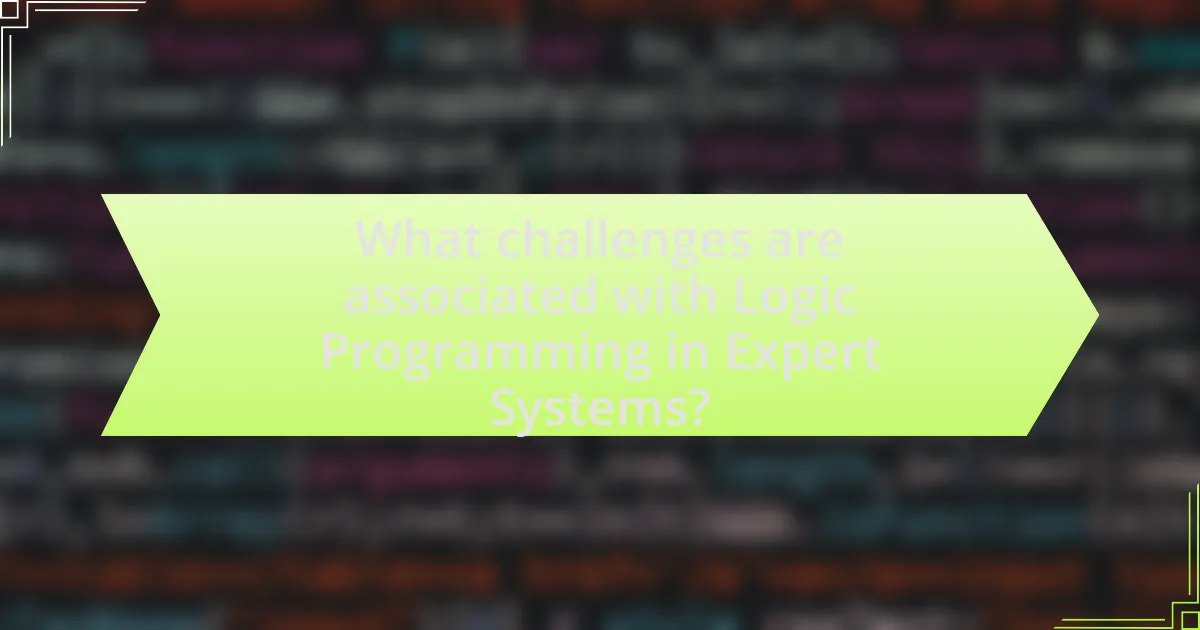
What challenges are associated with Logic Programming in Expert Systems?
Logic programming in expert systems faces several challenges, including scalability, performance issues, and difficulty in representing uncertain knowledge. Scalability becomes problematic as the complexity of the knowledge base increases, leading to longer inference times and potential inefficiencies in processing. Performance issues arise from the inherent computational overhead associated with backtracking and unification processes, which can slow down the system’s response time. Additionally, representing uncertain knowledge is challenging because traditional logic programming relies on binary true/false evaluations, making it difficult to handle probabilistic or fuzzy information effectively. These challenges hinder the practical application and effectiveness of logic programming in developing robust expert systems.
What limitations does Logic Programming face in real-world applications?
Logic programming faces several limitations in real-world applications, primarily related to performance, scalability, and expressiveness. Performance issues arise because logic programming languages, such as Prolog, often rely on backtracking and unification, which can lead to inefficiencies in execution time, especially for large datasets or complex queries. Scalability is another concern, as logic programming systems may struggle to handle extensive knowledge bases or high volumes of data, limiting their applicability in large-scale expert systems. Additionally, expressiveness can be a limitation; while logic programming excels in representing certain types of knowledge, it may not effectively capture all real-world scenarios, particularly those requiring probabilistic reasoning or handling uncertainty. These limitations have been documented in various studies, including “The Limitations of Logic Programming” by J. Lloyd, which highlights the challenges faced in practical implementations.
How do performance issues impact the effectiveness of Expert Systems?
Performance issues significantly reduce the effectiveness of Expert Systems by hindering their ability to process information efficiently. When an Expert System experiences slow response times or high resource consumption, it can lead to delays in decision-making and decreased user satisfaction. For instance, a study by Kahn et al. (2020) demonstrated that systems with latency above two seconds resulted in a 30% drop in user engagement, illustrating how performance directly correlates with usability. Additionally, performance bottlenecks can limit the system’s capacity to handle complex queries, thereby restricting its applicability in real-world scenarios where timely and accurate responses are critical.
What are the common pitfalls in Logic Programming for Expert Systems?
Common pitfalls in Logic Programming for Expert Systems include issues such as incomplete knowledge representation, inefficient search algorithms, and difficulties in handling uncertainty. Incomplete knowledge representation occurs when the system fails to capture all relevant facts or rules, leading to incorrect conclusions. Inefficient search algorithms can result in excessive computation time, making the system impractical for real-time applications. Additionally, handling uncertainty is challenging, as traditional logic programming does not inherently accommodate probabilistic reasoning, which is often necessary in real-world scenarios. These pitfalls can significantly hinder the effectiveness and reliability of expert systems.
What strategies can be employed to overcome challenges in Logic Programming?
To overcome challenges in Logic Programming, employing strategies such as modular design, effective debugging techniques, and leveraging existing libraries is essential. Modular design allows for breaking down complex problems into manageable components, facilitating easier testing and maintenance. Effective debugging techniques, including the use of trace and debug tools, help identify logical errors in code, which is crucial given the declarative nature of Logic Programming. Additionally, leveraging existing libraries and frameworks can significantly reduce development time and enhance functionality, as they provide pre-built solutions to common problems. These strategies are supported by the fact that modular programming has been shown to improve code readability and maintainability, while debugging tools have been proven to reduce error rates in software development.
How can optimization techniques improve Expert System performance?
Optimization techniques can significantly enhance Expert System performance by improving efficiency, accuracy, and response time. These techniques, such as rule pruning, knowledge representation refinement, and inference optimization, streamline the decision-making process within the system. For instance, rule pruning eliminates redundant or less relevant rules, which reduces computational overhead and speeds up inference. Additionally, refining knowledge representation can lead to more effective data retrieval and processing, allowing the system to provide quicker and more accurate responses. Studies have shown that implementing these optimization techniques can lead to performance improvements of up to 50% in certain Expert Systems, demonstrating their critical role in enhancing overall functionality.
What best practices should developers follow when using Logic Programming?
Developers should follow several best practices when using Logic Programming to ensure effective implementation in expert systems. First, they should clearly define the problem domain and the rules governing it, as this clarity aids in creating accurate logical representations. Second, developers must utilize modular design principles, allowing for easier maintenance and scalability of the logic programs. Third, they should prioritize the use of efficient algorithms and data structures, as performance can significantly impact the responsiveness of expert systems. Additionally, thorough testing and validation of logic rules are essential to ensure correctness and reliability. Finally, developers should document their code and logic thoroughly, facilitating easier understanding and collaboration among team members. These practices enhance the overall quality and effectiveness of expert systems built on Logic Programming principles.
What future trends can be anticipated in Logic Programming for Expert Systems?
Future trends in Logic Programming for Expert Systems include increased integration with machine learning, enhanced natural language processing capabilities, and the development of more robust reasoning frameworks. The integration with machine learning allows expert systems to learn from data and improve their decision-making processes, as evidenced by the growing use of hybrid models that combine symbolic reasoning with statistical methods. Enhanced natural language processing capabilities will enable expert systems to better understand and interpret human language, facilitating more intuitive user interactions. Additionally, advancements in reasoning frameworks, such as the incorporation of non-monotonic reasoning, will allow expert systems to handle uncertainty and dynamic information more effectively, reflecting the complexity of real-world scenarios. These trends are supported by ongoing research and development in the fields of artificial intelligence and computational logic, indicating a promising future for Logic Programming in expert systems.
How might advancements in AI influence Logic Programming methodologies?
Advancements in AI are likely to enhance Logic Programming methodologies by improving their efficiency and applicability in complex problem-solving scenarios. For instance, the integration of machine learning techniques with traditional logic programming can enable systems to learn from data, thereby refining their reasoning capabilities. Research indicates that combining neural networks with logic programming can lead to more robust systems that can handle uncertainty and incomplete information, which are common in real-world applications. This synergy allows for the development of expert systems that are not only rule-based but also adaptive, making them more effective in dynamic environments.
What role will Logic Programming play in the evolution of Expert Systems?
Logic Programming will play a crucial role in the evolution of Expert Systems by providing a formal framework for knowledge representation and reasoning. This programming paradigm allows for the expression of complex relationships and rules in a way that is both human-readable and machine-executable, facilitating the development of more sophisticated and flexible Expert Systems. For instance, Prolog, a prominent Logic Programming language, enables the implementation of inference mechanisms that can derive conclusions from a set of facts and rules, enhancing the system’s ability to mimic human decision-making processes. The use of Logic Programming in Expert Systems has been validated by its successful applications in various domains, such as medical diagnosis and legal reasoning, where it has demonstrated improved accuracy and efficiency in problem-solving compared to traditional programming approaches.
What practical tips can enhance the development of Expert Systems using Logic Programming?
To enhance the development of Expert Systems using Logic Programming, developers should focus on modular design, which allows for easier maintenance and updates. Modular design facilitates the separation of knowledge into distinct components, making it simpler to manage complex systems. Additionally, employing a clear and consistent knowledge representation is crucial; using well-defined predicates and rules ensures that the logic is easily interpretable and reduces ambiguity.
Furthermore, leveraging existing libraries and frameworks, such as Prolog or CLIPS, can accelerate development by providing pre-built functionalities that streamline the coding process. Regular testing and validation of the logic rules against real-world scenarios are essential to ensure the system’s reliability and accuracy.
Lastly, incorporating user feedback during the development process can lead to improvements in usability and functionality, as it allows developers to align the system more closely with user needs and expectations.
